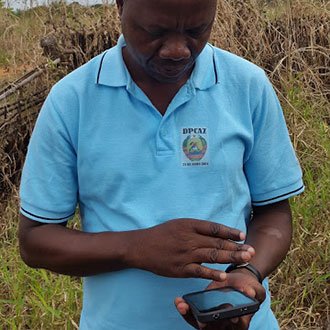Maputo, Mozambique
Environmental Director for Mozambique’s Ministry of Environment in Zambezia Province, Zaqueu F.B. Chicuate was first introduced to indoor residual spraying (IRS) in 2007. Dr. Chicuate, who has worked in environmental compliance for 15 years, recently shared his experiences with the PMI AIRS Project in helping to mitigate any potential negative effects that could result from working with insecticide.
PMI AIRS Project: Can you talk about your work with the PMI AIRS Project?
Zaqueu F.B. Chicuate: I work closely with the PMI AIRS Project’s environmental compliance officer as well as the Ministry of Agriculture to ensure we are using the environmental compliance tools developed by the project. From the pre-spray environmental assessment of the operational sites and facilities to the inspections before and after the spray campaign, we work to mitigate negative environmental impacts of IRS. I also help with the training of spray operators and field supervision.
PMI AIRS: Do you have any personal experience with malaria?
ZFBC: I had malaria when I was very young. Growing up, family members and others around us were infected with malaria. Many years ago, malaria was often misdiagnosed, and traditional customs that were considered taboos prevented us from taking precautions to prevent and/or treat malaria.
PMI AIRS: What has surprised you most about working with the PMI AIRS Project?
ZFBC: There have been so many very positive aspects, starting with the commitment to bettering the lives of the Mozambican population through opportunities to get involved and the introduction of tools for more effective implementation. In the past year, I have been particularly pleased with the priorities established for gender balance in the work place to ensure women have better opportunities in IRS.
PMI AIRS: What do you find most challenging about your job?
ZFBC: Getting spray operators and others to adhere to the established norms and procedures for environmental compliance in handling insecticide can be challenging. But it’s extremely important in to ensure the protection of the population and the environment. I’d like to see all the people united in the fight against malaria observing fully the environmental procedures.
PMI AIRS: What kind of impact have you seen from the PMI AIRS Project?
ZFBC: The PMI AIRS Project emphasizes quality services through rigor and commitment in the fight against malaria. As a result, there has been a noticeable reduction in malaria cases and greater awareness, behavior change, and commitment by our population on basic sanitation, individually and collectively towards a malaria free country. Abt is a champion in engaging partners and colleagues in the program. My hope is that the PMI AIRS Project stays the course to building Mozambique’s capacity to eradicate malaria.
PMI AIRS: What might (someone) be surprised to know about you?
ZFBC: My total commitment to this program at times is not fully understood by others around me, but I have found a home with the AIRS project.
PMI AIRS: What do you do when you aren’t working?
ZFBC: Born and raised in the city of Quelimane, Zambezia Province, I am family man, and really enjoy spending time with them, whether playing or supporting them through their education and everyday life.
This story was taken from www.africairs.net.

